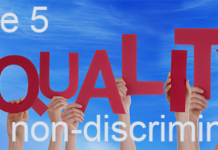Access to electoral system
Although disabled people in the UK do for the most part have formal voting rights, rates of voting are significantly lower. Results of a survey in 2010[1] on accessibility for disabled voters found that 67% of polling stations still presented significant barriers, an improvement of just 1% since the 2005 general election and 2% since the 2001 election. 47% of postal voters also reported accessibility problems and the provision of large ballot papers in polling stations had fallen from 70% in 2005 to 49% in 2010.
The percentage of disabled people that vote is very low: for instance, only 1 in 5 people with learning difficulties voted in the 2005 general election, although this increased to 1 in 3 people in 2010[2] following a NGO campaign.[3] The main barriers that prevented people with learning difficulties from voting were inaccessible language and the complexity of the voting process. Research highlights the need to improve the accessibility of information prior to an election, alternative formats are ‘…rarely or intermittently available in alternative formats and there is a dearth of easy read material’.[4] Deaf people are also excluded by failure to provide interpreters for election campaigns, public debates and the BBC Parliament channel which also lacks subtitles.
Access to elected office
Approximately 19% of the population are disabled[5], while less than 5% of disabled people hold public appointments.[6] If the numbers of disabled Members of Parliament (MPs) reflected the proportion of disabled people in the UK’s there would be about 129 disabled MPs. It is extremely doubtful if the actual number is anywhere near this figure; for example, research has indicated that: ‘…of the 650 MPs in the UK parliament currently only one is a wheelchair user.’[7] There are no Deaf MPs. But data on the number of disabled MPs across all impairments is not collected so the actual number is not known.[8] Also MPs have not always disclosed a disability because of a stigma/prejudice against disabled people. No support is provided for disabled candidates: for example, Deaf candidates must fund interpreters themselves which is a prohibitive cost. Greater numbers of disabled MPs would ensure that disability dimensions of mainstream policy priorities are highlighted and would provide disabled people with role models people.[9]
[1] Scope (2010) Polls Apart 2010: opening elections to disabled people, http://www.scope.org.uk/sites/default/files/pdfs/Campaigns_policy/Scope-Polls%20Apart%205%20Report.pdf.
[2] http://www.mencap.org.uk/campaigns/take-action/get-my-vote .
[3] http://www.mencap.org.uk/campaigns/take-action/get-my-vote .
[4] Academic Network of European Disability experts (ANED), ‘United Kingdom 2013 ANED Country Reports on citizenship and political participation’. Available at: http://www.disability-europe.net/.
[5] 11.5 million people in the UK who are covered by the disability provisions set out in the Equality Act. This is 19% of the population: ‘Fulfilling Potential: Building Understanding Report’ http://odi.dwp.gov.uk/fulfilling-potential/index.php
[6] United Kingdom ANED 2013 Country reports on citizenship …
[7] Academic Network of European Disability experts (ANED), ‘United Kingdom 2013 ANED Country Reports on citizenship and political participation’. Available at: http://www.disability-europe.net/.
[8] http://www.publications.parliament.uk/pa/spconf/167/167we04.htm
[9] http://www.publications.parliament.uk/pa/spconf/167/167we04.htm



